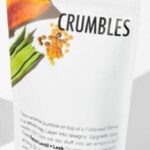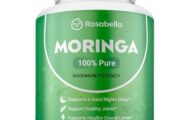These Memorial Day food safety tips from the USDA will help you and your family stay safe this summer. Summer cooking and parties are prime time for possible food poisoning cases for several reasons. Warmer temperatures and outdoor picnics, parties, and grilling pose special challenges. Under Secretary for Food Safety Dr. Emilio Esteban said in a statement, "The bacteria that cause foodborne illness love the summertime as much as we do because they thrive and multiply quickly in warmer temperatures. This causes illnesses to spike during the summer. As we all spend more time outside, it is important to remember these food safety steps to keep your friends and family safe." First, always wash your hands thoroughly with soap and water before you start cooking and eating. If safe … [Read more...]
FDA Takes Tara Flour Off Generally Regarded as Safe List
The FDA has removed tara flour from the generally regarded as safe list (GRAS) after illnesses associated with the product Daily Harvest Leek and Lentil Crumble illnesses were reported. There were reports of 393 illnesses associated with that product in 2022. At least 133 people were hospitalized, and some of the patients went into liver failure. Tara flour is now regarded as an unapproved food additive. These items are deemed to be unsafe under the Federal Food, Drug, and Cosmetic Act. That type of flour was used by Daily Harvest in a leek and lentil crumble product. The firm voluntarily recalled the product and conducted their own root cause analysis. The FDA has found no evidence that tara flour caused the outbreak, but it did prompt the agency to evaluate the status of that … [Read more...]
One-Third of Food Outbreaks Linked to Non-Irradiated Food
One-third of food outbreaks are linked to non-irradiated foods, according to a report in the Centers for Disease Control and Prevention's Emerging Infectious Diseases report for June 2024. Those foods are eligible for irradiation treatment, which kills pathogens and extends the life of produce and other foods. Of 482 outbreaks, 155 were linked to an irradiation-eligible food; none of those foods were irradiated. Irradiation is controversial, with some significant consumer resistance and large fixed costs. The FDA has approved certain foods for this type of treatment, including poultry, fresh shell eggs, spices, and meat. The FDA says that food irradiation is safe, and can control pathogens and insects. It can reduce the use of pesticides on foods, and can preserve food for … [Read more...]
Ground Beef Tests Negative For Avian Influenza, Says USDA
Ground beef tests negative for Avian Influenza, the USDA said on May 1, 2024. With the outbreak of highly pathogenic avian influenza (H5N1) affecting not only birds, but cattle in recent weeks, there had been some concern that the virus would be found in ground beef. The virus has been found intact in raw milk, but only fragments of the pathogen have been discovered in pasteurized milk. The USDA collected samples of ground beef from retail stores in states where dairy cattle herds had tested positive for the virus at the time of sample collection. The samples were sent to APHIS National Veterinary Services Laboratory for PCR testing. All samples had tested negative for H5N1, which reaffirms that the meat supply is safe. Of course, avoiding raw milk and cooking all ground beef … [Read more...]
Food Recalls Have Reached Highest Levels Since Covid
Food recalls have reached their highest level since before the Covid pandemic happened in 2020, according to U.S. PIRG. During the pandemic, food recalls dropped precipitously. The lead poisoning outbreak linked to WanaBana cinnamon applesauce products and the Salmonella outbreak linked to cantaloupe helped drive those recalls. At least 500 children were sickened in the WanaBana outbreak, and in the cantaloupe outbreak, at least 407 people were sickened, 158 people were hospitalized, and six people died. That agency has released a report, "Food For Thought 2024," which found that food and beverage recalls increased by 8% in 2023. Meat, poultry and egg recalls issued by the USDA hit the highest levels since before the pandemic. FDA recalls have been about the same for the least … [Read more...]
Salmonella in Raw Breaded Stuffed Chicken Is an Adulterant
Salmonella in raw breaded stuffed chicken products is an adulterant, according to a policy finalized today by the USDA. These items have been linked to many outbreaks in the United States over the last few years. The proposal was released in April 2023. These items are declared adulterated when they exceed a specific threshold (1 colony forming unit per gram or higher) for Salmonella. This is part of a broader USDA effort to reduce Salmonella illnesses associated with the raw poultry supply. Contamination in other raw poultry products will be addressed later this year. Agriculture Secretary Tom Vilsack said in a statement, "Under President Biden’s leadership, USDA is taking significant steps toward keeping American consumers safe from foodborne illness. This final determination … [Read more...]
FDA Updates Highly Pathogenic Avian Influenza Outbreak
The FDA has updated information about the highly pathogenic avian influenza outbreak (HPAI), which has spread to dairy cows. The virus can be transmitted by wild birds of domestic poultry and other animal species. Sporadic human infections have also occurs. The "highly pathogenic" definition revers to the effect on birds, not necessarily in people. The infection in cows is causing decreased lactation, low appetite, and other symptoms in cattle. Based on information that is currently available, the commercial milk supply is still safe, according to the FDA, because of the pasteurization process and the diversion of destruction of milk from sick cows. WebMD has stated that particles of the bird flu virus have been detected in pasteurized milk, but particles of the pathogen will not … [Read more...]
Consumer Reports Tracks Pesticides on Fresh Produce
Consumer Reports tracks pesticides on produce and has released the results of their research. They say that since the 1960s, some chemicals used on American crops have unacceptable health risks. Some pesticides are banned in the United States, but the government has been slow to act on banning others. And when a chemical is removed from the market, companies and growers may use others that can be just as hazardous to your health. Consumer Reports conducted a comprehensive review of pesticides in food by analyzing seven years of data from the Department of Agriculture. Every year, that agency tests a selection of conventionally grown and organic produce that is grown in the U.S. or imported. CR looked at 59 common fruits and vegetables, including the fresh version, canned, dried, and … [Read more...]
FDA Updates PFAS Testing Info in the General Food Supply
The FDA is updating information on PFAS testing in the general food supply. The agency is estimating dietary exposure to PFAS (per- and polyfluoroalkyl substances) for American consumers. The FDA has been testing fresh and processed foods for these chemicals since 2019. Nearly 1300 samples from a wide range of foods have been tested. PFAS include chemicals that resist grease, oil, water, and heat. They were first used in the 1940s and are now in hundreds of products. Some PFAS are authorized by the FDA for limited use in food packaging, cookware, and food processing equipment. Accumulation of some PFAS does occur in humans and animals. And some types of PFAS have been associated with serious health problems. Of 95 samples tested, the FDA detected PFAS in eight samples. They … [Read more...]














